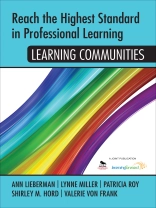When teachers learn from each other, students reap the benefits.
Learning Forward is a leader in understanding and advancing professional learning that leads to student success. This book is the first in a series exploring each of Learning Forward’s seven Standards for Professional Learning, which outline the characteristics of effective professional learning. In this book, the authors help readers understand what it takes to establish and maintain professional learning communities (PLCs) that align with the Learning Forward standards and increase educator effectiveness in order to provide the best outcomes for students. Its features include:
- An original essay by thought leaders Ann Lieberman and Lynne Miller designed to stretch readers’ thinking on the Learning Communities standard by introducing the underlying theory, research, and practice behind learning communities
- A comprehensive guide to implementing the Learning Communities standard, with an overview of six critical attributes of PLCs and the seven-step cycle of continuous improvement
- A case study of the district-wide implementation of PLCs that led to changed practices for educators and improved results for students, containing detailed analysis of what worked
With these tools in hand to strengthen professional learning, new heights of effective teaching, leadership and student achievement are within your school’s reach.
Mục lục
Introduction to the Series – Stephanie Hirsh
The Learning Forward Standards for Professional Learning
The Learning Communities Standard
About the Series Editors
About the Contributors
1. Unpacking Professional Learning Communities: Getting From Here to There – Ann Lieberman and Lynne Miller
2. Creating Learning Communities – Shirley M. Hord and Patricia Roy
3. The Case Study – Valerie von Frank
Resources
Index
Giới thiệu về tác giả
Shirley M. Hord, Ph D, is the scholar laureate of Learning Forward (previously National Staff Development Council), following her retirement as Scholar Emerita at the Southwest Educational Development Laboratory in Austin, Texas. There she directed the Strategies for Increasing Student Success Program. She continues to design and coordinate professional development activities related to educational change and improvement, school leadership, and the creation of professional learning communities. Her early roles as elementary school classroom teacher and university science education faculty at The University of Texas at Austin were followed by her appointment as co-director of Research on the Improvement Process at the Research and Development Center for Teacher Education at The University of Texas at Austin. There she administered and conducted research on school improvement and the role of school leaders in school change. She served as a fellow of the National Center for Effective Schools Research and Development and was U.S. representative to the Foundation for the International School Improvement Project, an international effort that develops research, training, and policy initiatives to support local school improvement practices. In addition to working with educators at all levels across the U.S. and Canada, Hord makes presentations and consults in Asia, Europe, Australia, Africa, and Mexico. Her current interests focus on the creation and functioning of educational organizations as learning communities and the role of leaders who serve such organizations. Dr. Hord is the author of numerous articles and books, of which a selection of the most recent are: Implementing Change: Patterns, Principles, and Potholes, 3rd ed (with Gene E. Hall, 2011); Reclaiming Our Teaching Profession: The Power of Educators Learning in Community (with Edward F. Tobia, 2012); A Playbook for Professional Learning: Putting the Standards Into Action (with Stephanie Hirsh, 2012).












